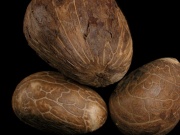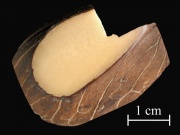Vegetable ivory
Description
The hard, cream-colored seed of the any of several palm trees. Vegetable ivory resembles true ivory in appearance and hardness, but it has a fibrous microscopic structure. Ivory nuts were used for small carved items, buttons, cane heads, and Japanese netsuke. They accept dyes readily and can be polished to a glossy luster. Some of the vegetable ivory palms are:
- ivory nut - Phytelephas macrocarpa, found in Colombia and Ecuador
- doum palm nuts - Hyphaene thebaica, found in Africa
- tagua palm nuts - Phytelephas euqatorialis, found in South America
- apple nuts - Metroxylon amicarum, found in the South Pacific
Synonyms and Related Terms
ivory nut; doom palm nut; gingerbread palm nut; apple nut; tagua nut; dom nut
Additional Information
J.Thornton,"The Structure of Ivory and Ivory Substitutes", AIC Preprints, Philadelphia, 1981, p.173-181.
Sources Checked for Data in Record
- G.S.Brady, Materials Handbook, McGraw-Hill Book Co., New York, 1971 Comment: p. 424
- Hermann Kuhn, Conservation and Restoration of Works of Art and Antiquities, Butterworths, London, 1986
- Random House, Webster's Encyclopedic Unabridged Dictionary of the English Language, Grammercy Book, New York, 1997
- The American Heritage Dictionary or Encarta, via Microsoft Bookshelf 98, Microsoft Corp., 1998

